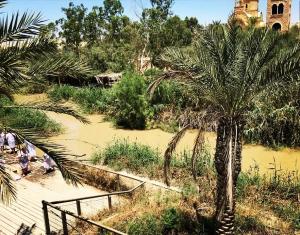It’s not the usual way that Epiphany itself falls on a Sunday so that the Baptism of Jesus gets to have its own liturgical day. Usually the two—at least in the old episcopal calendar—are jumbled together. And, let’s be honest, it is hard to pass over the sparkle of the magi coming with expensive presents to really concentrate on Jesus demanding that John let him descend into a muddy river in order to “fulfill all righteousness.” What does that even mean?
So today we get the baptism in its own right, and I should have gotten my act together and hauled the nativity set out of the way, because Jesus is all grown up now, ready to “adult,” in the most cosmically functional way possible.
And what is the first thing on his list? Surely he will assemble a team of experts and make a big announcement on social media. He will market research for sure, and after that he will post a winsome Instagram, #blessed, and then a little YouTube gesture—Hey guys, I’m so excited about the new ministry I’m kicking off today. The likes mount up and his team bites their nails anxiously, praying for shares.
John has been down there in the Jordan mucking around for a while. All the people come out to him, some of them to be baptized, some of them to scoff and naysay. John scrutinizes the crowd and raises his voice, calling them to repent. Cut to the heart, most of them step down into the warm, murky water.
It’s an interesting thing to behold—the Jordan River. It’s not that big, at least not today, and not in the place where they think John baptized. You can go in the appalling heat and stand under a sort of wooden structure to stare out at what appears to be a mud puddle. People go in and bathe, still, and fill little bottles with the brown water, praying, and, in some cases, crying.
There had to have been more water at the time of John. If “all the people” came out to him, that would have been a lot of people to churn up the bottom of the river, the silt and mud swirling around as John lowered them down, one by one.
It wouldn’t have looked like a Sunday school picture. I imagine it would have been loud, and maybe disorienting. The people go down, not into the cool, quiet ancient mikvah baths surrounding the temple, but out there in the heat and jumble of thousands of other people. And so Jesus goes there too.
He is the anti-Kon-Mari. While everyone else goes to get rid of their burdens and troubles, leaving them behind in the mud and the water, Jesus, who had none, climbs down the bank and lies down, rising up drenched in the tragedy of sin, shouldering that alien burden upon his heart, like all those heavy gems sewn into the garment of the high priest. He goes down into that first watery grave and rises up, his face set towards Jerusalem.
And it is at this moment that he is in the perfect will of his Father in heaven. Which is a great tragedy for the anxious Christian.
Because surely the will of God must not be the burden of carrying along other people all the way to the cross. Surely the will of God must not include being weighed down with suffering, with misunderstanding, with alienation, with poverty and trouble. Everything in my soul tells me that, of course, the will of God must necessarily be the thrilling moment of discovering that I have some talent, some gift, that I will use “for the kingdom.” The whole wide world will see how good and blessed I am, how many rich things God has given me. The will of God is manifested in the satisfaction that God brings together all things for my good and my—is it glory?
The will of God must mean that I am in the right place at the right time, that my material circumstances are not only bearable, but pleasant, that my whole life is a spark of joy, that material, psychic, emotional and spiritual sorrow, pain, and suffering do not dog me moment by moment.
But the Father is well pleased with the Son, and the Spirit comes to rest on him like a dove—that peaceful, fluttering beauty that is the hope of every single person staggering under a weight of woe. He has done and is doing precisely the thing that he has, since before the foundation of the world, been called to do—to pick up and carry the sins of the people and die in their place. He is so called, so glorified, that he goes straight out into the wild wastes of the desert, alone, to be tempted by Satan, to wrestle once and for all, to battle with that great and terrible enemy of mankind.
The people on the bank wander away back to their own lives. They have a long way to walk, untroubled by the increasingly gaunt Hope that they leave behind. They arrive back home in the dusk—the clutter and irritation of a thousand things to do hitting the mind as the foot steps over the threshold. If only there were time to get rid of some of this junk, to rearrange the furniture, to deal with that matter that has been put off for far too long. But first someone must go to the shops because there is nothing for to eat. The pile of dirt that was swept up in the morning, and then left in the mad dash for the wildness, still has to be gathered up an thrown away. The neighbor stops by with some petty complaint, making the hour even later, and still no supper. Finally, the collapse into bed to lie awake, the troubles of life pressing sleep away to the dawn. They don’t know, they don’t see, they don’t understand.
And neither do we, mostly. We look at the strange character of Jesus and go on sorting through our stuff. But it was the will of the Father that the Son should carry it for us, that we should lay it down in the waters of baptism, and die so completely to the self, that his life would take over and make us clean and whole, that his suffering would stand in the place of our sin, that the burden of his very heart would be the free gift of eternal life.
If you’re looking for the will of God, go to church.












